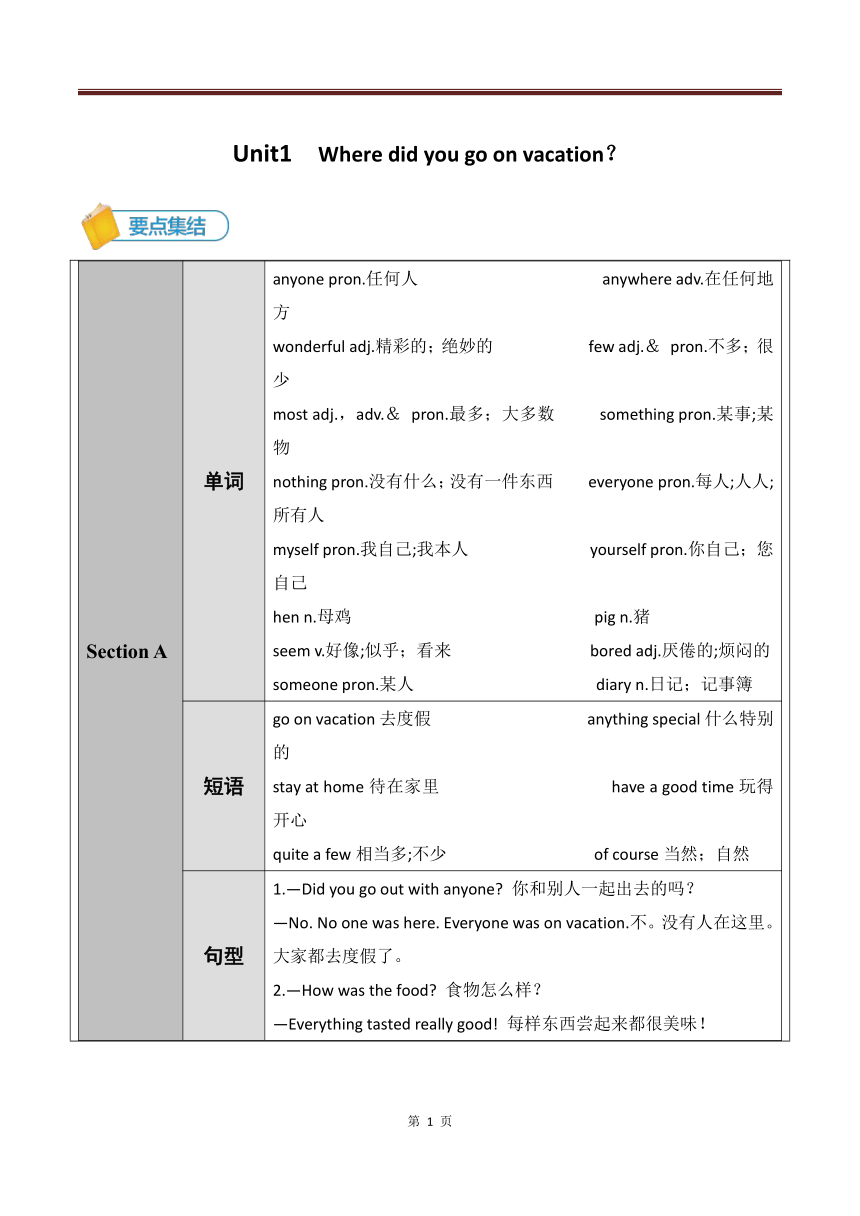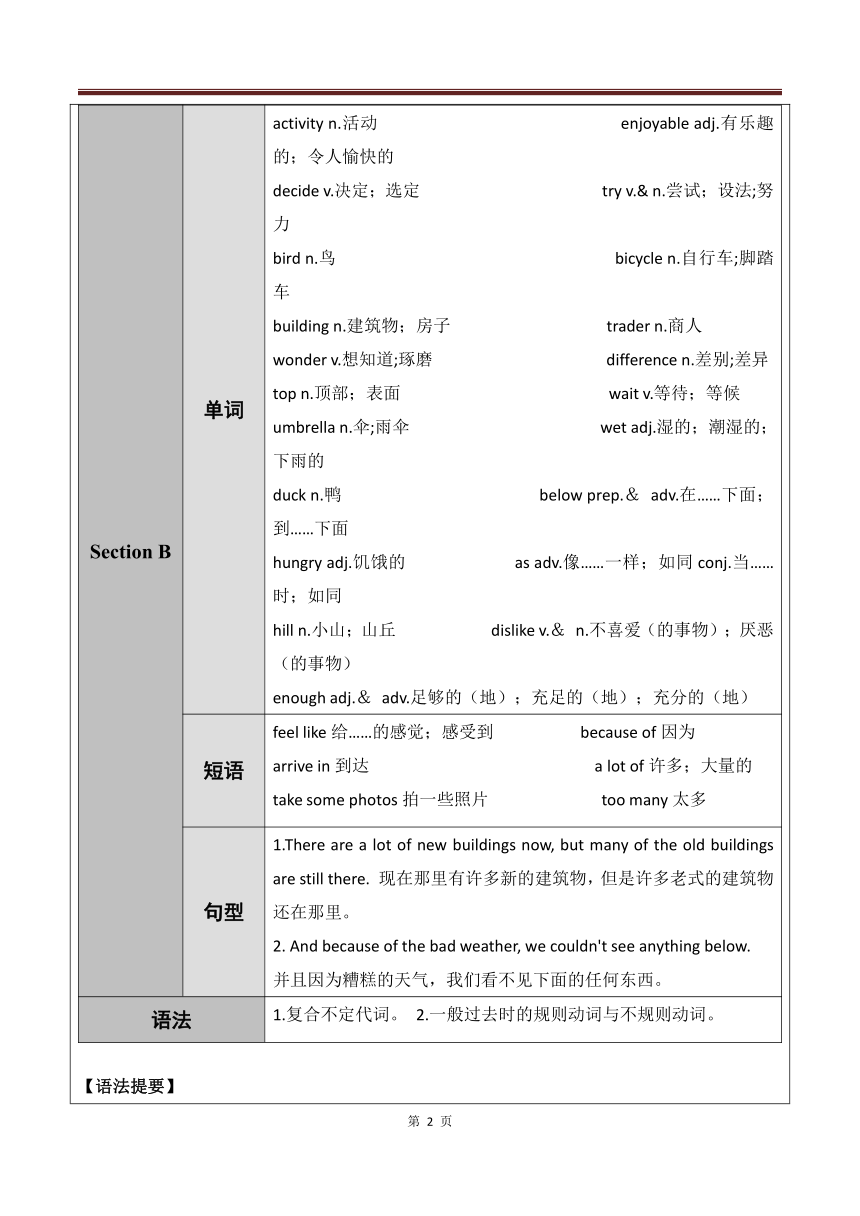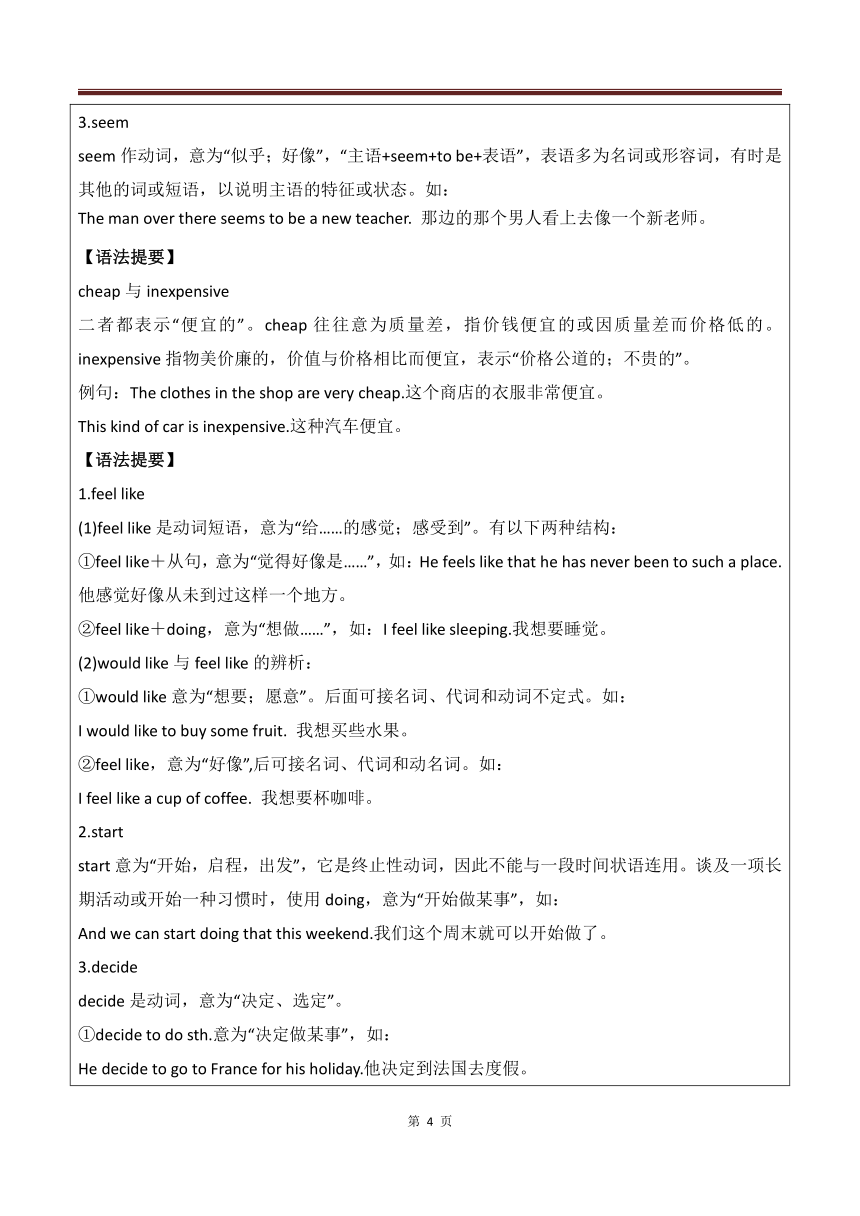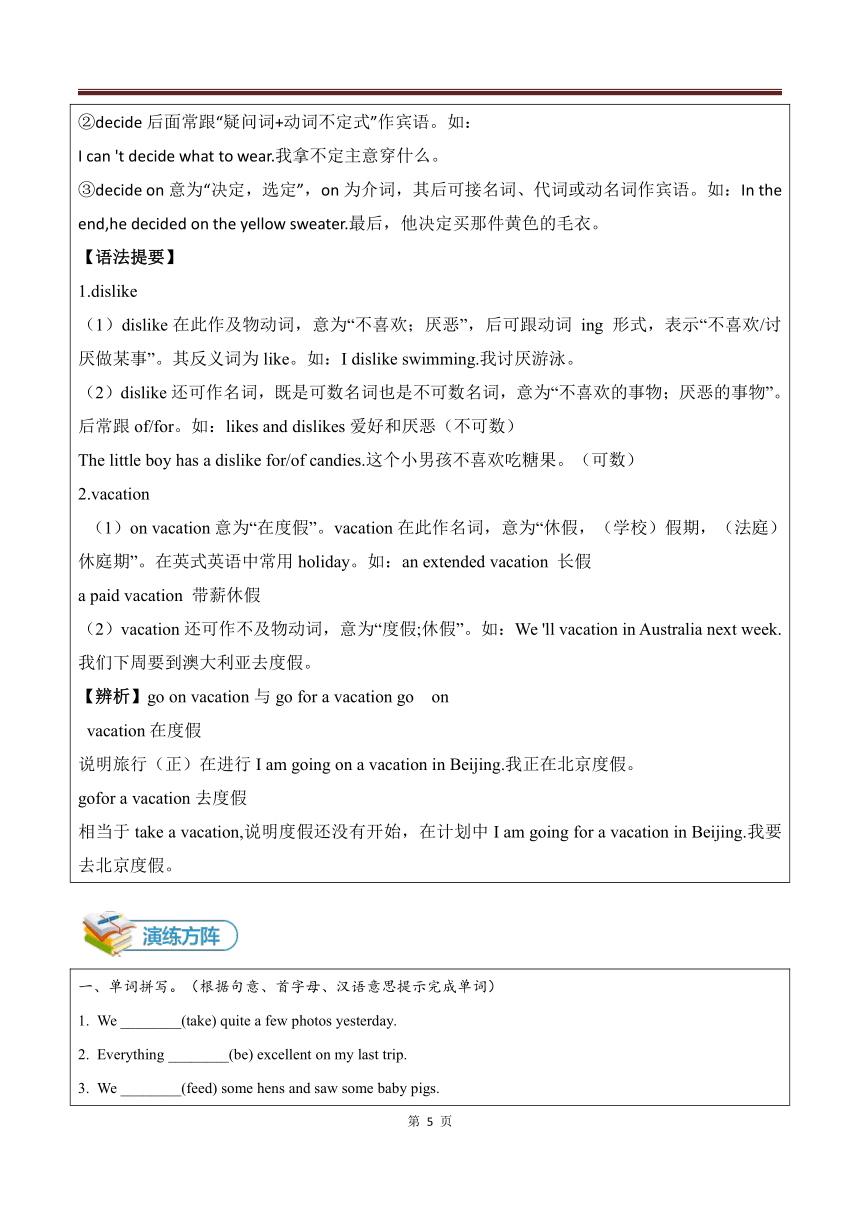Unit 1 Where did you go on vacation? 知识梳理与练习(含答案)
文档属性
| 名称 | Unit 1 Where did you go on vacation? 知识梳理与练习(含答案) |  | |
| 格式 | docx | ||
| 文件大小 | 78.4KB | ||
| 资源类型 | 教案 | ||
| 版本资源 | 人教新目标(Go for it)版 | ||
| 科目 | 英语 | ||
| 更新时间 | 2021-09-01 22:32:02 | ||
图片预览





文档简介
Unit1
Where
did
you
go
on
vacation?
Section
A单词anyone
pron.任何人
anywhere
adv.在任何地方
wonderful
adj.精彩的;绝妙的
few
adj.&
pron.不多;很少
most
adj.,adv.&
pron.最多;大多数
something
pron.某事;某物
nothing
pron.没有什么;没有一件东西
everyone
pron.每人;人人;所有人
myself
pron.我自己;我本人
yourself
pron.你自己;您自己
hen
n.母鸡
pig
n.猪
seem
v.好像;似乎;看来
bored
adj.厌倦的;烦闷的
someone
pron.某人
diary
n.日记;记事簿短语go
on
vacation去度假
anything
special什么特别的
stay
at
home待在家里
have
a
good
time玩得开心
quite
a
few相当多;不少
of
course当然;自然句型1.—Did
you
go
out
with
anyone?
你和别人一起出去的吗?
—No.
No
one
was
here.
Everyone
was
on
vacation.不。没有人在这里。大家都去度假了。
2.—How
was
the
food?
食物怎么样?
—Everything
tasted
really
good!
每样东西尝起来都很美味!Section
B单词activity
n.活动
enjoyable
adj.有乐趣的;令人愉快的
decide
v.决定;选定
try
v.&
n.尝试;设法;努力
bird
n.鸟
bicycle
n.自行车;脚踏车
building
n.建筑物;房子
trader
n.商人
wonder
v.想知道;琢磨
difference
n.差别;差异
top
n.顶部;表面
wait
v.等待;等候
umbrella
n.伞;雨伞
wet
adj.湿的;潮湿的;下雨的
duck
n.鸭
below
prep.&
adv.在……下面;到……下面
hungry
adj.饥饿的
as
adv.像……一样;如同conj.当……时;如同
hill
n.小山;山丘
dislike
v.&
n.不喜爱(的事物);厌恶(的事物)
enough
adj.&
adv.足够的(地);充足的(地);充分的(地)短语feel
like给……的感觉;感受到
because
of因为
arrive
in到达
a
lot
of许多;大量的
take
some
photos拍一些照片
too
many太多句型1.There
are
a
lot
of
new
buildings
now,
but
many
of
the
old
buildings
are
still
there.
现在那里有许多新的建筑物,但是许多老式的建筑物还在那里。
2.
And
because
of
the
bad
weather,
we
couldn't
see
anything
below.
并且因为糟糕的天气,我们看不见下面的任何东西。语法1.复合不定代词。
2.一般过去时的规则动词与不规则动词。
【语法提要】
1.where
did
you
go…?
where
did
you
go…?是一般过去时的疑问句,where是特殊疑问副词,对地点提问,意为“在哪里,在什么地方”,did是助动词。实义动词一般过去式的一般疑问句,一般借助助动词did。如:—Did
you
have
a
good
time?你们玩得很高兴吗?—Yes,we
did.是的。
2.quite
a
few.
quite
a
few
意为“相当多;不少”,修饰可数名词复数。如:There
are
quite
a
few
books
on
his
shelf.
他的书架上有不少书。
(1)few意为“不多,很少”,表否定的意思,即几乎没有,可修饰可数名词。如:
There
are
few
people
in
the
room.屋子里几乎没有人。
(2)a
few意为“几个,有几个,有一点”,表肯定,即还有几个(一点),修饰可数名词复数。如:There
are
a
few
apples
on
the
table.桌子上还有几个苹果。
3.most
of
the
time.
most
of
the
time意为“大部分时间”,其中most为代词,意为“大部分;大多数;大体上”。如:It
's
noisy
here
most
of
the
time.这儿大部分时间是很喧闹的。Most
of
the
food
goes
bad.
大部分的食物变质了。
most
of…意为“……中的大多数”,作主语时,谓语动词取决于most
of后所修饰的名词。
【语法提要】
1.How+be动词…?
“How+be动词…?”意为“……怎么样?”可与
“What+be动词+…like?”互换。how是疑问副词,意为“如何,怎么样”。如:
—How
was
your
holiday?
=
What
was
your
holiday
like?
你的假期怎么样?
—It
was
great./It
's
not
bad./It
was
excellent.很棒。/还不错。/好极了。
拓展:当询问某人或某事物持久的特征、特性时,通常用“What+be动词+…like?”而不用“How+be动词…?”。
2.of
course
of
course在口语中,意为“当然;自然”,通常在对话中用作回答,有时与not连用。如:
Of
course,I
wish
both
of
you
well.
当然我希望你们俩都身体健康。
—Are
you
coming
with
us?你和我们一起去吗?
—Of
course.
当然啦。
3.seem
seem作动词,意为“似乎;好像”,“主语+seem+to
be+表语”,表语多为名词或形容词,有时是其他的词或短语,以说明主语的特征或状态。如:
The
man
over
there
seems
to
be
a
new
teacher.
那边的那个男人看上去像一个新老师。
【语法提要】
cheap与inexpensive
二者都表示“便宜的”。cheap往往意为质量差,指价钱便宜的或因质量差而价格低的。inexpensive指物美价廉的,价值与价格相比而便宜,表示“价格公道的;不贵的”。
例句:The
clothes
in
the
shop
are
very
cheap.这个商店的衣服非常便宜。
This
kind
of
car
is
inexpensive.这种汽车便宜。
【语法提要】
1.feel
like
(1)feel
like是动词短语,意为“给……的感觉;感受到”。有以下两种结构:
①feel
like+从句,意为“觉得好像是……”,如:He
feels
like
that
he
has
never
been
to
such
a
place.他感觉好像从未到过这样一个地方。
②feel
like+doing,意为“想做……”,如:I
feel
like
sleeping.我想要睡觉。
(2)would
like与feel
like的辨析:
①would
like意为“想要;愿意”。后面可接名词、代词和动词不定式。如:
I
would
like
to
buy
some
fruit.
我想买些水果。
②feel
like,意为“好像”,后可接名词、代词和动名词。如:
I
feel
like
a
cup
of
coffee.
我想要杯咖啡。
2.start
start意为“开始,启程,出发”,它是终止性动词,因此不能与一段时间状语连用。谈及一项长期活动或开始一种习惯时,使用doing,意为“开始做某事”,如:
And
we
can
start
doing
that
this
weekend.我们这个周末就可以开始做了。
3.decide
decide是动词,意为“决定、选定”。
①decide
to
do
sth.意为“决定做某事”,如:
He
decide
to
go
to
France
for
his
holiday.他决定到法国去度假。
②decide后面常跟“疑问词+动词不定式”作宾语。如:
I
can
't
decide
what
to
wear.我拿不定主意穿什么。
③decide
on意为“决定,选定”,on为介词,其后可接名词、代词或动名词作宾语。如:In
the
end,he
decided
on
the
yellow
sweater.最后,他决定买那件黄色的毛衣。
【语法提要】
1.dislike
(1)dislike在此作及物动词,意为“不喜欢;厌恶”,后可跟动词
ing
形式,表示“不喜欢/讨厌做某事”。其反义词为like。如:I
dislike
swimming.我讨厌游泳。
(2)dislike还可作名词,既是可数名词也是不可数名词,意为“不喜欢的事物;厌恶的事物”。后常跟of/for。如:likes
and
dislikes爱好和厌恶(不可数)
The
little
boy
has
a
dislike
for/of
candies.这个小男孩不喜欢吃糖果。(可数)
2.vacation
(1)on
vacation意为“在度假”。vacation在此作名词,意为“休假,(学校)假期,(法庭)休庭期”。在英式英语中常用holiday。如:an
extended
vacation
长假
a
paid
vacation
带薪休假
(2)vacation还可作不及物动词,意为“度假;休假”。如:We
'll
vacation
in
Australia
next
week.我们下周要到澳大利亚去度假。
【辨析】go
on
vacation与go
for
a
vacation
go
on
vacation在度假
说明旅行(正)在进行I
am
going
on
a
vacation
in
Beijing.我正在北京度假。
gofor
a
vacation去度假
相当于take
a
vacation,说明度假还没有开始,在计划中I
am
going
for
a
vacation
in
Beijing.我要去北京度假。
一、单词拼写。(根据句意、首字母、汉语意思提示完成单词)
We
________(take)
quite
a
few
photos
yesterday.
Everything
________(be)
excellent
on
my
last
trip.
We
________(feed)
some
hens
and
saw
some
baby
pigs.
There
are
a
lot
of
new
________(building)
now.
I
really
enjoyed
_________(walk)
around
the
town.
6.My
father
didn’t
bring
_________(足够的)
money.
7.I
_______(想知道)
what
life
was
like
here
in
the
past.
8.We
w________
over
an
hour
for
the
train
because
there
were
too
many
people.
9.Why
didn’t
you
buy
anything
for
_________(你自己)?
10.What
________(活动)
do
you
find
enjoyable?
参考答案
1、took
2、was
3、fed
4.
buildings
5.walking
6.
enough
7.wonder
8.waited
9.yourself
10.activities
二、翻译(根据中文提示完成句子)。
1.
Where
did
you
?
?
?
(去度假)?
2.
上周因为天气不好,他们没有举行运动会。
They
didn't
hold
the
sports
meeting
last
week
?
?
the
bad
weather.
3.
警察决定在天黑前进入那个房子。(词数不限)
The
policemen
?
that
house
before
it
got
dark.
4.
昨天的天气怎么样?
the
weather
yesterday?
5.
我们没有事情告诉你。
We
didn't
have
?
to
tell
you.
【参考答案】翻译(根据中文提示完成句子)
1.
go
on
vacation
2.
because
of
3.
decided
to
enter
4.
How
was
5.
anything
三、单项选择
(
)1.
--What
______
of
dumplings
would
you
like?
--Mutton
and
carrot
dumplings,
please.
A.
kind
B.
size
C.
bowl
D.
price
(
)2.
My
sister
Alice
can’t
play
_____piano,
but
she
can
play
______chess.
A.
the;
the
B.
the;
/
C.
the;
a
D.
/;
the
(
)3.
--
Bigbang’s
concert(音乐会)
was
_______
eight
o’clock
_______the
evening
of
July
1st!
--Yeah,
I
went
there
and
it
was
so
exciting!
A.
at;
in
B.
at;
on
C.
on;
in
D.
in;
on
(
)4.
--Jack,
could
you
please
not
________
your
iPad
to
school?
--
OK,
Mrs.
Smith.
I
won’t
next
time.
A.
forget
B.
leave
C.
take
D.
bring
(
)5.
Look!
One
of
the
girls_______
in
the
swimming
pool.
A.
swim
B.
is
swiming
C.
is
swimming
D.
are
swimming
(
)6._______
kind
girl
Jenny
is!
What
B.
What
a
C.
How
D.
How
a
(
)7.Did
you
study
______your
test?
on
B.at
C.for
D.in
(
)8.—I
didn’t
bring
back
anything
from
Malaysia.
—_______
at
all?
Something
B.Anything
C.Nothing
D.Everything
(
)9.She
isn’t
________to
carry
the
box.
enough
strong
B.strong
enough
C.enough
young
D.young
enough
(
)10.---Oh,
dear,
we
have____food
left.
---don’t
worry.
I’ll
go
and
buy
some.
a
few
B.a
little
C.few
D.little
(
)11.
It
is
a
world
of
flowers
in
spring
in
Dongying.
You
can
see
flowers
?.
A.
here
B.
there
C.
somewhere
D.
everywhere
(
)12.
I
don't
have
a
present
for
my
friend.
What
if
?
else
brings
a
present?
A.
anybody
B.
nobody
C.
everyone
D.
none
(
)13.
There
is
?
with
the
machine
and
soon
it
will
work.
A.
something
serious
B.
nothing
serious
C.
serious
something
D.
wrong
something
(
)14.
---
How
can
I
make
friends
in
a
new
school?
---
Say
hello
to
?
to
you
today,
and
you
can
have
a
friend
tomorrow.
A.
new
someone
B.
someone
new
C.
new
anyone
(
)15.
They
?
her
to
the
party,
so
she
was
very
happy.
A.
invite
B.
invited
C.
will
invite
D.
are
inviting
参考答案
1--5、ABBDC
6--10、BCCBD
11—15、DCBBB
四、完形填空。
Soccer
is
one
of
the
world’s
favorite
sports.
Do
you
know
___1____
soccer
started?
Well,
it
started
in
China!
Over
2300
years
ago,
the
___2____
soccer
game
started
in
Zibo,
Shandong.
At
that
time
soldiers(士兵)
from
QiGuo
had
a
bad
time
fighting
with
other
countries.
When
they
were
free,
they
wanted
to
play
games__3__.
So
they
started
to
run
after
a
ball
with
other
soldiers.
At
that
time,
they
___4____
it
“Cuju(蹴鞠)”.
Now,
this
game
is
___5___
popular
that
people
around
the
world
join
in
it.
They
not
only
play
it
for
fun
but
also
like
to
watch
the
exciting
soccer
games.
These
days,
2016
Euro
Cup
is
going
on.
The
best
soccer
teams(队伍)
and
players
from
different
countries
are
all
in
France.
And
__6__team
has
its
fan
family
to
cheer(欢呼)
for
them.
This
year,
the
number
of
the
soccer
teams
__7__24.
Which
is
your
favorite
__8__
in
2016
Euro
Cup?
For
me,
I
like
Portugal(葡萄牙)
team
best
because
Cristiano
Ronaldo
is
so
talented
in
soccer!
Chinese
people
made
this
game
first
but
__9__
they
weren’t
very
good
at
it.
I
think
that
soccer
is
a
great
sport,
and
we
can
learn
a
lot___10___
it.
And
I
wish
one
day
our
Chinese
soccer
team
can
show
the
best
in
World
Cup.
(
)1.A.when
B.
where
C.
how
D.
what
(
)2.
A.
first
B.
new
C.
most
D.
last
(
)3.
A.
relax
B.
relaxing
C.
relaxed
D.
to
relax
(
)4.
A.
said
B.
named
C.
answered
D.
asked
(
)5.
A.
very
B.
really
C.
so
D.
too
(
)6.
A.
each
B.
all
C.
some
D.
any
(
)7.
A.
was
B.
is
C.
are
D.
were
(
)8.
A.
team
B.
sport
C.
player
D.
interest
(
)9.
A.
luck
B.
luckily
C.
unlucky
D.
unluckily
(
)10.
A.
with
B.
for
C.
from
D.
to
参考答案(完形填空)1-5
BADBC
6-10
ABADC
五、阅读理解。
A
John
is
eight
years
old,
and
he
is
a
very
funny
boy.
He
works
hard,
so
he
is
good
at
his
subjects.
And
his
teachers
and
parents
like
him
very
much.
But
he
has
a
very
big
head.
Last
year,
he
spent
ten
days
in
his
uncle's
home
on
summer
vacation.
His
uncle
lives
in
a
mountain
village
and
it's
about
four
hundred
miles
away
from
his
city.
He
took
a
train
to
a
small
town.
There
his
uncle
waited
for
him
and
took
him
to
his
house
by
bike.
John
made
some
friends
soon.
They
played
games
and
swam
in
the
river
happily.
But
one
afternoon
he
cried
to
his
aunt,
"All
the
children
make
fun
of
me.
They
say
I
have
a
big
head."
"Don't
listen
to
them,"
his
aunt
said.
"You
have
a
beautiful
head.
Now
stop
crying
and
go
to
the
store
to
buy
fifty
potatoes."
"Where
is
the
shopping
bag?"
"Oh,
dear.
I
haven't
got
one.
Use
your
hat."
1.
John
does
well
in
his
subjects
because
?.
A.
his
teachers
like
him
B.
he
works
hard
C.
his
parents
help
him
D.
he
is
very
clever
2.
How
did
John's
uncle
take
him
home?
A.
By
train.
B.
By
car.
C.
By
bus.
D.
By
bike.
3.
The
underlined
words
"make
fun
of"
mean
?
in
Chinese.
A.
取笑
B.
批评
C.
羡慕
D.
喜欢
4.
From
the
last
words
between
John
and
his
aunt,
we
know
?.
A.
John's
aunt
has
a
big
head
B.
John
couldn't
buy
potatoes
C.
John
really
has
a
big
head
D.
John
had
a
beautiful
hat
5.
What's
the
best
title
for
the
passage?
A.
A
Big
Hat
B.
A
Funny
Vacation
C.
John
and
His
Uncle
D.
A
Boy
With
a
Big
Head
参考答案1—5、BDACD
1.?visited?museums?参观博物馆
?2.?went?to?summer?camp?去夏令营?3.?stayed?at?home?呆在家?
4.?go?on?vacation?度假5.?study?for?tests?学习备考?6.?meet?anyone?interesting?遇见有趣的人?7.?do?anything?special做特别的事情?8.?anywhere?interesting?有趣的地方?9.?take?quite?a?few?photos照很多照片?10.?most?of?the?time?大多数时候?11.?taste?really?good/?great.尝起来真好极了?12.?buy?something?for?somebody=?buy?somebody?something?为某人买某物?13.?in?the?countryside在农村?
14.?at?a?restaurant在饭店15.?keep?a?diary写日记?16.?arrive?in?/?at=?get?to?=?reach?到达….?17.?decide?to?do?something?决定做……18.?near?our?hotel在我们的宾馆附近?19.?try?doing?something?尝试做某事?20.?feel?like?doing?something?想要做某事?21.?ride?bicycles?to?…?骑自行车去…22.?a?lot?of?new?buildings?许多新建筑?23.?many?of?the?old?buildings许多老建筑?24.?Chinese?traders?from?100?years?ago?100年前的中国商人?25.?enjoy?walking?around?the?town?喜欢在市里漫步?26.?walk?up?to?the?top?of?the?hill步行上山顶?27.?start?raining?a?little?开始下小雨
?28.?take?the?train乘火车?29.?waited?over?an?hour?for?the?train?等了两个多小时的火车?30.?enough?money?足够的钱
31.?old?enough足够老?32.?another?two?hours?另外两个小时?33.?a?bag?with?some?food?and?water装有食物和水的口袋?34.?so…?that…如此……以至于……?35.?keep?going继续走?
36.?go?on继续?37.?jump?up?and?down跳上跳下
?38.?in?excitement兴奋地?39.?twenty?minutes?later
20分钟以后?40.?bring?an?umbrella带雨伞?
41.?home?cooking家常菜?
Where
did
you
go
on
vacation?
Section
A单词anyone
pron.任何人
anywhere
adv.在任何地方
wonderful
adj.精彩的;绝妙的
few
adj.&
pron.不多;很少
most
adj.,adv.&
pron.最多;大多数
something
pron.某事;某物
nothing
pron.没有什么;没有一件东西
everyone
pron.每人;人人;所有人
myself
pron.我自己;我本人
yourself
pron.你自己;您自己
hen
n.母鸡
pig
n.猪
seem
v.好像;似乎;看来
bored
adj.厌倦的;烦闷的
someone
pron.某人
diary
n.日记;记事簿短语go
on
vacation去度假
anything
special什么特别的
stay
at
home待在家里
have
a
good
time玩得开心
quite
a
few相当多;不少
of
course当然;自然句型1.—Did
you
go
out
with
anyone?
你和别人一起出去的吗?
—No.
No
one
was
here.
Everyone
was
on
vacation.不。没有人在这里。大家都去度假了。
2.—How
was
the
food?
食物怎么样?
—Everything
tasted
really
good!
每样东西尝起来都很美味!Section
B单词activity
n.活动
enjoyable
adj.有乐趣的;令人愉快的
decide
v.决定;选定
try
v.&
n.尝试;设法;努力
bird
n.鸟
bicycle
n.自行车;脚踏车
building
n.建筑物;房子
trader
n.商人
wonder
v.想知道;琢磨
difference
n.差别;差异
top
n.顶部;表面
wait
v.等待;等候
umbrella
n.伞;雨伞
wet
adj.湿的;潮湿的;下雨的
duck
n.鸭
below
prep.&
adv.在……下面;到……下面
hungry
adj.饥饿的
as
adv.像……一样;如同conj.当……时;如同
hill
n.小山;山丘
dislike
v.&
n.不喜爱(的事物);厌恶(的事物)
enough
adj.&
adv.足够的(地);充足的(地);充分的(地)短语feel
like给……的感觉;感受到
because
of因为
arrive
in到达
a
lot
of许多;大量的
take
some
photos拍一些照片
too
many太多句型1.There
are
a
lot
of
new
buildings
now,
but
many
of
the
old
buildings
are
still
there.
现在那里有许多新的建筑物,但是许多老式的建筑物还在那里。
2.
And
because
of
the
bad
weather,
we
couldn't
see
anything
below.
并且因为糟糕的天气,我们看不见下面的任何东西。语法1.复合不定代词。
2.一般过去时的规则动词与不规则动词。
【语法提要】
1.where
did
you
go…?
where
did
you
go…?是一般过去时的疑问句,where是特殊疑问副词,对地点提问,意为“在哪里,在什么地方”,did是助动词。实义动词一般过去式的一般疑问句,一般借助助动词did。如:—Did
you
have
a
good
time?你们玩得很高兴吗?—Yes,we
did.是的。
2.quite
a
few.
quite
a
few
意为“相当多;不少”,修饰可数名词复数。如:There
are
quite
a
few
books
on
his
shelf.
他的书架上有不少书。
(1)few意为“不多,很少”,表否定的意思,即几乎没有,可修饰可数名词。如:
There
are
few
people
in
the
room.屋子里几乎没有人。
(2)a
few意为“几个,有几个,有一点”,表肯定,即还有几个(一点),修饰可数名词复数。如:There
are
a
few
apples
on
the
table.桌子上还有几个苹果。
3.most
of
the
time.
most
of
the
time意为“大部分时间”,其中most为代词,意为“大部分;大多数;大体上”。如:It
's
noisy
here
most
of
the
time.这儿大部分时间是很喧闹的。Most
of
the
food
goes
bad.
大部分的食物变质了。
most
of…意为“……中的大多数”,作主语时,谓语动词取决于most
of后所修饰的名词。
【语法提要】
1.How+be动词…?
“How+be动词…?”意为“……怎么样?”可与
“What+be动词+…like?”互换。how是疑问副词,意为“如何,怎么样”。如:
—How
was
your
holiday?
=
What
was
your
holiday
like?
你的假期怎么样?
—It
was
great./It
's
not
bad./It
was
excellent.很棒。/还不错。/好极了。
拓展:当询问某人或某事物持久的特征、特性时,通常用“What+be动词+…like?”而不用“How+be动词…?”。
2.of
course
of
course在口语中,意为“当然;自然”,通常在对话中用作回答,有时与not连用。如:
Of
course,I
wish
both
of
you
well.
当然我希望你们俩都身体健康。
—Are
you
coming
with
us?你和我们一起去吗?
—Of
course.
当然啦。
3.seem
seem作动词,意为“似乎;好像”,“主语+seem+to
be+表语”,表语多为名词或形容词,有时是其他的词或短语,以说明主语的特征或状态。如:
The
man
over
there
seems
to
be
a
new
teacher.
那边的那个男人看上去像一个新老师。
【语法提要】
cheap与inexpensive
二者都表示“便宜的”。cheap往往意为质量差,指价钱便宜的或因质量差而价格低的。inexpensive指物美价廉的,价值与价格相比而便宜,表示“价格公道的;不贵的”。
例句:The
clothes
in
the
shop
are
very
cheap.这个商店的衣服非常便宜。
This
kind
of
car
is
inexpensive.这种汽车便宜。
【语法提要】
1.feel
like
(1)feel
like是动词短语,意为“给……的感觉;感受到”。有以下两种结构:
①feel
like+从句,意为“觉得好像是……”,如:He
feels
like
that
he
has
never
been
to
such
a
place.他感觉好像从未到过这样一个地方。
②feel
like+doing,意为“想做……”,如:I
feel
like
sleeping.我想要睡觉。
(2)would
like与feel
like的辨析:
①would
like意为“想要;愿意”。后面可接名词、代词和动词不定式。如:
I
would
like
to
buy
some
fruit.
我想买些水果。
②feel
like,意为“好像”,后可接名词、代词和动名词。如:
I
feel
like
a
cup
of
coffee.
我想要杯咖啡。
2.start
start意为“开始,启程,出发”,它是终止性动词,因此不能与一段时间状语连用。谈及一项长期活动或开始一种习惯时,使用doing,意为“开始做某事”,如:
And
we
can
start
doing
that
this
weekend.我们这个周末就可以开始做了。
3.decide
decide是动词,意为“决定、选定”。
①decide
to
do
sth.意为“决定做某事”,如:
He
decide
to
go
to
France
for
his
holiday.他决定到法国去度假。
②decide后面常跟“疑问词+动词不定式”作宾语。如:
I
can
't
decide
what
to
wear.我拿不定主意穿什么。
③decide
on意为“决定,选定”,on为介词,其后可接名词、代词或动名词作宾语。如:In
the
end,he
decided
on
the
yellow
sweater.最后,他决定买那件黄色的毛衣。
【语法提要】
1.dislike
(1)dislike在此作及物动词,意为“不喜欢;厌恶”,后可跟动词
ing
形式,表示“不喜欢/讨厌做某事”。其反义词为like。如:I
dislike
swimming.我讨厌游泳。
(2)dislike还可作名词,既是可数名词也是不可数名词,意为“不喜欢的事物;厌恶的事物”。后常跟of/for。如:likes
and
dislikes爱好和厌恶(不可数)
The
little
boy
has
a
dislike
for/of
candies.这个小男孩不喜欢吃糖果。(可数)
2.vacation
(1)on
vacation意为“在度假”。vacation在此作名词,意为“休假,(学校)假期,(法庭)休庭期”。在英式英语中常用holiday。如:an
extended
vacation
长假
a
paid
vacation
带薪休假
(2)vacation还可作不及物动词,意为“度假;休假”。如:We
'll
vacation
in
Australia
next
week.我们下周要到澳大利亚去度假。
【辨析】go
on
vacation与go
for
a
vacation
go
on
vacation在度假
说明旅行(正)在进行I
am
going
on
a
vacation
in
Beijing.我正在北京度假。
gofor
a
vacation去度假
相当于take
a
vacation,说明度假还没有开始,在计划中I
am
going
for
a
vacation
in
Beijing.我要去北京度假。
一、单词拼写。(根据句意、首字母、汉语意思提示完成单词)
We
________(take)
quite
a
few
photos
yesterday.
Everything
________(be)
excellent
on
my
last
trip.
We
________(feed)
some
hens
and
saw
some
baby
pigs.
There
are
a
lot
of
new
________(building)
now.
I
really
enjoyed
_________(walk)
around
the
town.
6.My
father
didn’t
bring
_________(足够的)
money.
7.I
_______(想知道)
what
life
was
like
here
in
the
past.
8.We
w________
over
an
hour
for
the
train
because
there
were
too
many
people.
9.Why
didn’t
you
buy
anything
for
_________(你自己)?
10.What
________(活动)
do
you
find
enjoyable?
参考答案
1、took
2、was
3、fed
4.
buildings
5.walking
6.
enough
7.wonder
8.waited
9.yourself
10.activities
二、翻译(根据中文提示完成句子)。
1.
Where
did
you
?
?
?
(去度假)?
2.
上周因为天气不好,他们没有举行运动会。
They
didn't
hold
the
sports
meeting
last
week
?
?
the
bad
weather.
3.
警察决定在天黑前进入那个房子。(词数不限)
The
policemen
?
that
house
before
it
got
dark.
4.
昨天的天气怎么样?
the
weather
yesterday?
5.
我们没有事情告诉你。
We
didn't
have
?
to
tell
you.
【参考答案】翻译(根据中文提示完成句子)
1.
go
on
vacation
2.
because
of
3.
decided
to
enter
4.
How
was
5.
anything
三、单项选择
(
)1.
--What
______
of
dumplings
would
you
like?
--Mutton
and
carrot
dumplings,
please.
A.
kind
B.
size
C.
bowl
D.
price
(
)2.
My
sister
Alice
can’t
play
_____piano,
but
she
can
play
______chess.
A.
the;
the
B.
the;
/
C.
the;
a
D.
/;
the
(
)3.
--
Bigbang’s
concert(音乐会)
was
_______
eight
o’clock
_______the
evening
of
July
1st!
--Yeah,
I
went
there
and
it
was
so
exciting!
A.
at;
in
B.
at;
on
C.
on;
in
D.
in;
on
(
)4.
--Jack,
could
you
please
not
________
your
iPad
to
school?
--
OK,
Mrs.
Smith.
I
won’t
next
time.
A.
forget
B.
leave
C.
take
D.
bring
(
)5.
Look!
One
of
the
girls_______
in
the
swimming
pool.
A.
swim
B.
is
swiming
C.
is
swimming
D.
are
swimming
(
)6._______
kind
girl
Jenny
is!
What
B.
What
a
C.
How
D.
How
a
(
)7.Did
you
study
______your
test?
on
B.at
C.for
D.in
(
)8.—I
didn’t
bring
back
anything
from
Malaysia.
—_______
at
all?
Something
B.Anything
C.Nothing
D.Everything
(
)9.She
isn’t
________to
carry
the
box.
enough
strong
B.strong
enough
C.enough
young
D.young
enough
(
)10.---Oh,
dear,
we
have____food
left.
---don’t
worry.
I’ll
go
and
buy
some.
a
few
B.a
little
C.few
D.little
(
)11.
It
is
a
world
of
flowers
in
spring
in
Dongying.
You
can
see
flowers
?.
A.
here
B.
there
C.
somewhere
D.
everywhere
(
)12.
I
don't
have
a
present
for
my
friend.
What
if
?
else
brings
a
present?
A.
anybody
B.
nobody
C.
everyone
D.
none
(
)13.
There
is
?
with
the
machine
and
soon
it
will
work.
A.
something
serious
B.
nothing
serious
C.
serious
something
D.
wrong
something
(
)14.
---
How
can
I
make
friends
in
a
new
school?
---
Say
hello
to
?
to
you
today,
and
you
can
have
a
friend
tomorrow.
A.
new
someone
B.
someone
new
C.
new
anyone
(
)15.
They
?
her
to
the
party,
so
she
was
very
happy.
A.
invite
B.
invited
C.
will
invite
D.
are
inviting
参考答案
1--5、ABBDC
6--10、BCCBD
11—15、DCBBB
四、完形填空。
Soccer
is
one
of
the
world’s
favorite
sports.
Do
you
know
___1____
soccer
started?
Well,
it
started
in
China!
Over
2300
years
ago,
the
___2____
soccer
game
started
in
Zibo,
Shandong.
At
that
time
soldiers(士兵)
from
QiGuo
had
a
bad
time
fighting
with
other
countries.
When
they
were
free,
they
wanted
to
play
games__3__.
So
they
started
to
run
after
a
ball
with
other
soldiers.
At
that
time,
they
___4____
it
“Cuju(蹴鞠)”.
Now,
this
game
is
___5___
popular
that
people
around
the
world
join
in
it.
They
not
only
play
it
for
fun
but
also
like
to
watch
the
exciting
soccer
games.
These
days,
2016
Euro
Cup
is
going
on.
The
best
soccer
teams(队伍)
and
players
from
different
countries
are
all
in
France.
And
__6__team
has
its
fan
family
to
cheer(欢呼)
for
them.
This
year,
the
number
of
the
soccer
teams
__7__24.
Which
is
your
favorite
__8__
in
2016
Euro
Cup?
For
me,
I
like
Portugal(葡萄牙)
team
best
because
Cristiano
Ronaldo
is
so
talented
in
soccer!
Chinese
people
made
this
game
first
but
__9__
they
weren’t
very
good
at
it.
I
think
that
soccer
is
a
great
sport,
and
we
can
learn
a
lot___10___
it.
And
I
wish
one
day
our
Chinese
soccer
team
can
show
the
best
in
World
Cup.
(
)1.A.when
B.
where
C.
how
D.
what
(
)2.
A.
first
B.
new
C.
most
D.
last
(
)3.
A.
relax
B.
relaxing
C.
relaxed
D.
to
relax
(
)4.
A.
said
B.
named
C.
answered
D.
asked
(
)5.
A.
very
B.
really
C.
so
D.
too
(
)6.
A.
each
B.
all
C.
some
D.
any
(
)7.
A.
was
B.
is
C.
are
D.
were
(
)8.
A.
team
B.
sport
C.
player
D.
interest
(
)9.
A.
luck
B.
luckily
C.
unlucky
D.
unluckily
(
)10.
A.
with
B.
for
C.
from
D.
to
参考答案(完形填空)1-5
BADBC
6-10
ABADC
五、阅读理解。
A
John
is
eight
years
old,
and
he
is
a
very
funny
boy.
He
works
hard,
so
he
is
good
at
his
subjects.
And
his
teachers
and
parents
like
him
very
much.
But
he
has
a
very
big
head.
Last
year,
he
spent
ten
days
in
his
uncle's
home
on
summer
vacation.
His
uncle
lives
in
a
mountain
village
and
it's
about
four
hundred
miles
away
from
his
city.
He
took
a
train
to
a
small
town.
There
his
uncle
waited
for
him
and
took
him
to
his
house
by
bike.
John
made
some
friends
soon.
They
played
games
and
swam
in
the
river
happily.
But
one
afternoon
he
cried
to
his
aunt,
"All
the
children
make
fun
of
me.
They
say
I
have
a
big
head."
"Don't
listen
to
them,"
his
aunt
said.
"You
have
a
beautiful
head.
Now
stop
crying
and
go
to
the
store
to
buy
fifty
potatoes."
"Where
is
the
shopping
bag?"
"Oh,
dear.
I
haven't
got
one.
Use
your
hat."
1.
John
does
well
in
his
subjects
because
?.
A.
his
teachers
like
him
B.
he
works
hard
C.
his
parents
help
him
D.
he
is
very
clever
2.
How
did
John's
uncle
take
him
home?
A.
By
train.
B.
By
car.
C.
By
bus.
D.
By
bike.
3.
The
underlined
words
"make
fun
of"
mean
?
in
Chinese.
A.
取笑
B.
批评
C.
羡慕
D.
喜欢
4.
From
the
last
words
between
John
and
his
aunt,
we
know
?.
A.
John's
aunt
has
a
big
head
B.
John
couldn't
buy
potatoes
C.
John
really
has
a
big
head
D.
John
had
a
beautiful
hat
5.
What's
the
best
title
for
the
passage?
A.
A
Big
Hat
B.
A
Funny
Vacation
C.
John
and
His
Uncle
D.
A
Boy
With
a
Big
Head
参考答案1—5、BDACD
1.?visited?museums?参观博物馆
?2.?went?to?summer?camp?去夏令营?3.?stayed?at?home?呆在家?
4.?go?on?vacation?度假5.?study?for?tests?学习备考?6.?meet?anyone?interesting?遇见有趣的人?7.?do?anything?special做特别的事情?8.?anywhere?interesting?有趣的地方?9.?take?quite?a?few?photos照很多照片?10.?most?of?the?time?大多数时候?11.?taste?really?good/?great.尝起来真好极了?12.?buy?something?for?somebody=?buy?somebody?something?为某人买某物?13.?in?the?countryside在农村?
14.?at?a?restaurant在饭店15.?keep?a?diary写日记?16.?arrive?in?/?at=?get?to?=?reach?到达….?17.?decide?to?do?something?决定做……18.?near?our?hotel在我们的宾馆附近?19.?try?doing?something?尝试做某事?20.?feel?like?doing?something?想要做某事?21.?ride?bicycles?to?…?骑自行车去…22.?a?lot?of?new?buildings?许多新建筑?23.?many?of?the?old?buildings许多老建筑?24.?Chinese?traders?from?100?years?ago?100年前的中国商人?25.?enjoy?walking?around?the?town?喜欢在市里漫步?26.?walk?up?to?the?top?of?the?hill步行上山顶?27.?start?raining?a?little?开始下小雨
?28.?take?the?train乘火车?29.?waited?over?an?hour?for?the?train?等了两个多小时的火车?30.?enough?money?足够的钱
31.?old?enough足够老?32.?another?two?hours?另外两个小时?33.?a?bag?with?some?food?and?water装有食物和水的口袋?34.?so…?that…如此……以至于……?35.?keep?going继续走?
36.?go?on继续?37.?jump?up?and?down跳上跳下
?38.?in?excitement兴奋地?39.?twenty?minutes?later
20分钟以后?40.?bring?an?umbrella带雨伞?
41.?home?cooking家常菜?
同课章节目录
- Unit 1 Where did you go on vacation?
- Section A
- Section B
- Unit 2 How often do you exercise?
- Section A
- Section B
- Unit 3 I'm more outgoing than my sister.
- Section A
- Section B
- Unit 4 What's the best movie theater?
- Section A
- Section B
- Unit 5 Do you want to watch a game show?
- Section A
- Section B
- Unit 6 I'm going to study computer science.
- Section A
- Section B
- Unit 7 Will people have robots?
- Section A
- Section B
- Unit 8 How do you make a banana milk shake?
- Section A
- Section B
- Unit 9 Can you come to my party?
- Section A
- Section B
- Unit 10 If you go to the party, you'll have a grea
- Section A
- Section B
